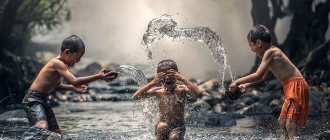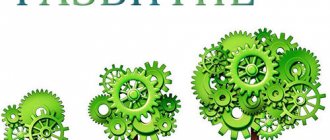Determinants of development
Determinants are factors and conditions that play a leading role in the development of something. In our case, these are the leading factors in the development of personality.
Heredity
In the article “The Concept of Personality in Psychology: Essence and Structure” we found that the phenomenon of a person as a person implies consideration of both elements: biological and social. The innate characteristics of a person, that is, temperament and body constitution, inclinations, etc., undoubtedly contribute to the formation of personality.
- Initially, theories about personality followed only this approach. It was generally accepted that heredity transmits genes, genes form the hormonal background, which forms the physique and psyche, and they give the shape of personality.
- A little later it became clear that individual characteristics make their contribution, but social factors have a greater influence on personal formation.
Environment
Personality is formed under the influence of the psychology of the group, with whose members it is on an equal footing. The environment influences the formation of personality through:
- culture;
- installations;
- norms and values of family, circle of friends, and other social groups;
- structure of the country.
The social environment shapes character, which is one of the elements of the personality structure.
Interesting fact: it has been scientifically proven that even the birth order of a child plays an important role in the formation of personality. Thus, children born first and subsequently having a brother or sister are more likely to:
- care about social acceptance or rejection;
- hardworking and responsible;
- prone to cooperation and submission to authorities;
- do not seek to break the rules;
- are distinguished by ambition;
- prone to feelings of guilt and anxiety.
Situation
This factor began to be identified as a separate category not so long ago. It is assumed that it restrains both the social and the natural in man. This is a kind of personality regulator.
- It is no secret that some situations dictate the style of behavior and the boundaries of what is acceptable or unacceptable. The more often a person finds himself in a situation of forced behavior, the easier it is for him to constantly show himself in this form.
- However, precisely because of the situational nature, it is impossible to judge a person’s personality in isolation.
Currently, attempts are being made to identify specific situations, their descriptions and the essence of the influence on the individual. But in practice this is very difficult to do. For now, to assess a personality, it remains necessary to have information about his behavior in various situations.
Activity as a condition for personality formation
The main condition for the formation of personality is activity:
- labor,
- educational,
- gaming,
- communication.
Each activity is specific and plays a certain role in human development, meets his age needs, and develops certain components of personality. You can read more about activity in the article “Human activity – what is it in psychology. Types of activities and their characteristics.”
Factors influencing personality formation
The formation of human personality is influenced by external and internal, biological and social factors. Factor (from Latin factor - doing, producing) is the driving force, the cause of any process, phenomenon (S.I. Ozhegov).
Internal factors include the individual’s own activity, generated by contradictions, interests and other motives, realized in self-education, as well as in activity and communication.
External factors include the macro-, meso- and microenvironment, natural and social, education in the broad and narrow, social and pedagogical sense.
Environment and upbringing are social factors, while heredity is a biological factor.
There have long been discussions among philosophers, sociologists, psychologists and educators about the relationship between biological social factors and the priority importance of certain ones in the development of a person’s personality.
Some of them argue that a person, his consciousness, abilities, interests and needs are determined by heredity (E. Thorndike, D. Dewey, A. Kobe, etc.). Representatives of this trend elevate hereditary factors (biological) to absolutes and deny the role of environment and upbringing (social factors) in the development of personality. They mistakenly transfer the achievements of biological science about the heredity of plants and animals to the human body. We are talking about the priority of innate abilities.
Other scientists believe that development depends entirely on the influence of social factors (J. Locke, J.-J. Rousseau, C. A. Helvetius, etc.). They deny a person’s genetic predisposition and argue that a child from birth is “a blank slate, on which you can write everything,” i.e. Development depends on upbringing and environment.
Some scientists (D. Diderot) believe that development is determined by an equal combination of the influence of biological and social factors.
K.D. Ushinsky argued that a person becomes a person not only under the influence of heredity, environment and upbringing, but also as a result of his own activities, ensuring the formation and improvement of personal qualities. A person is not only a product of heredity and the circumstances in which his life takes place, but also an active participant in the change and improvement of external factors. By changing them, a person changes himself.
Let us consider in more detail the essential side of the influence of leading factors on the development and formation of personality.
Some authors, as noted above, assign a decisive role to the biological factor—heredity. Heredity is the ability of organisms to pass on certain qualities and characteristics from parents to children. Heredity is determined by genes (translated from Greek “gene” means “giving birth”). Science has proven that the properties of an organism are encrypted in a kind of gene code that stores and transmits all information about the properties of the organism. Genetics has deciphered the hereditary program of human development. It has been established that it is heredity that determines what is common, what makes a person human, and what is different, what makes people different from each other.
What does a person inherit? The following are inherited from parents to children:
— anatomical and physiological structure reflecting the specific characteristics of an individual as a representative of the human race (Homo sapiens): the inclinations of speech, upright walking, thinking, labor activity;
- physical data: external racial characteristics, body features, constitution, facial features, hair, eye, skin color;
— physiological characteristics: metabolism, blood pressure and blood group, Rh factor, stages of maturation of the body;
— features of the nervous system: the structure of the cerebral cortex and its peripheral apparatus (visual, auditory, olfactory, etc.), the uniqueness of nervous processes, which determines the nature and a certain type of higher nervous activity;
— anomalies in the development of the body: color blindness (partial color blindness), “cleft lip”, “cleft palate”;
- predisposition to certain hereditary diseases: hemophilia (blood disease), diabetes mellitus, schizophrenia, endocrine disorders (dwarfism, etc.).
It is necessary to distinguish congenital human characteristics associated with changes in the genotype from acquired ones, which were the result of unfavorable living conditions. For example, complications after illness, physical injuries or oversights during the development of a child, violations of diet, labor, hardening of the body, etc. A deviation or change in the psyche can occur as a result of subjective factors: fear, severe nervous shock, drunkenness, etc. immoral actions of parents, other negative phenomena.
Acquired changes are not inherited. If the genotype is not changed, then some congenital individual characteristics of a person associated with his intrauterine development are also not inherited. These include many anomalies caused by such reasons as intoxication, radiation, the influence of alcohol, birth injuries, etc.
An extremely important question is whether intellectual, special and moral qualities are inherited? And also, what is passed on to children: ready-made abilities for a certain type of activity or just inclinations?
It has been established that only inclinations are inherited. Makings are the anatomical and physiological characteristics of the body, which are prerequisites for the development of abilities. Inclinations provide a predisposition to a particular activity.
There are two types of makings:
— universal (structure of the brain, central nervous system, receptors);
- individual (typological properties of the nervous system, on which the speed of formation of temporary connections, their strength, the strength of concentrated attention, mental performance depend; structural features of analyzers, individual areas of the cerebral cortex, organs, etc.).
Abilities are individual characteristics of a person, which are subjective conditions for the successful implementation of a certain type of activity. Abilities are not limited to knowledge, skills and abilities. They manifest themselves in the speed, depth and strength of mastery of methods and techniques of activity. High level of development of abilities - talent, genius.
Some scientists adhere to the concept of innate abilities (S. Burt, H. Eysenck, etc.). Most domestic specialists - physiologists, psychologists, teachers - consider abilities as lifetime formations that are formed in the process of life and as a result of upbringing. It is not abilities that are transferred, but only inclinations.
The inclinations inherited by a person can either be realized or not. Being an individual-natural basis of abilities, inclinations are an important, but insufficient condition for their development. In the absence of appropriate external factors and adequate activity, abilities may not develop even if the appropriate inclinations are present. Conversely, early achievements may indicate not special abilities, but rather an organization of activity and education that is adequate to the existing inclinations.
Some scientists believe that all people receive from nature high potential opportunities for the development of their mental and cognitive powers and are capable of almost unlimited spiritual development. The existing differences in the types of higher nervous activity change only the course of thought processes, but do not predetermine the quality and level of intellectual activity itself. These scientists do not agree with the idea that intelligence is passed on from parents to children.
At the same time, they recognize that heredity can adversely affect the development of intellectual abilities. A negative predisposition is created by brain cells in children of alcoholics, disturbed genetic structures in drug addicts, and some mental illnesses. The issue of inheriting abilities for intellectual (cognitive, educational) activities raises especially heated discussions.
Another group of scientists considers the existence of intellectual inequality of people to be a proven fact. Its cause is considered to be biological heredity. Hence the conclusion: intellectual abilities remain unchanged and constant.
Understanding the process of transferring intellectual inclinations is very important, as it predetermines the practical ways of educating and training people. Modern pedagogy focuses not on identifying differences and adapting education to them, but on creating conditions for the development of the inclinations that each person has.
An important issue is the inheritance of special inclinations and moral qualities. Special inclinations for a specific type of activity are called special. Special ones include musical, artistic, mathematical, linguistic, sports and other inclinations. It has been established that people with special inclinations achieve higher results and advance at a faster pace in the relevant field of activity. This can manifest itself at an early age if the necessary conditions are created.
Special abilities are inherited. In the history of mankind there have been many hereditary talents. It is known, for example, that J. S. Bach had 18 famous musicians in five generations of his ancestors. There were many talented people in the family of Charles Darwin.
Particularly significant is the question of the inheritance of moral qualities and psyche. For a long time, the prevailing assertion was that mental qualities are not inherited, but acquired in the process of interaction of the organism with the external environment. The social essence of the individual, his moral foundations are formed only during his lifetime.
It was believed that a person is born neither evil nor kind, neither stingy nor generous. Children do not inherit the moral qualities of their parents; human genetic programs do not contain information about social behavior. What a person becomes depends on his environment and upbringing.
At the same time, such prominent scientists as M. Montessori, K. Lorenz, E. Fromm argue that human morality is biologically determined. Moral qualities, behavior, habits and even actions, both positive and negative, are passed on from generation to generation (“the apple doesn’t fall far from the tree”). The basis for such conclusions is data obtained from the study of human and animal behavior. According to the teachings of I.P. Pavlov, both animals and humans have instincts and reflexes that are inherited. The behavior of highly organized living beings in some cases is instinctive, reflexive, based not on higher consciousness, but on the simplest biological reflexes. This means that moral qualities and behavior can be inherited.
This question is very complex and responsible. Recently, domestic scientists (P.K. Anokhin, N.M. Amosov, etc.) have taken a position on the genetic determination of human morality and social behavior.
In addition to heredity, the determining factor in personality development is the environment. The environment is the reality in which human development occurs. The formation of personality is influenced by the geographical, national, school, family, and social environment. The latter includes such characteristics as the social system, the system of production relations, material living conditions, the nature of production and social processes, etc.
The question of whether environment or heredity has a greater influence on human development remains debatable. The French philosopher K. A. Helvetius believed that all people from birth have the same potential for mental and moral development, and differences in mental characteristics are explained solely by the influence of the environment and educational influences. Real reality is understood in this case metaphysically; it fatally predetermines the fate of a person. The individual is viewed as a passive object of influence of circumstances.
Thus, all scientists recognize the influence of the environment on the formation of a person. The only thing that differs is their assessment of the degree of such influence on the formation of personality. This is due to the fact that there is no abstract medium. There is a specific social system, a person’s specific immediate and distant surroundings, specific living conditions. It is clear that a higher level of development is achieved in an environment where favorable conditions are created.
An important factor influencing human development is communication. Communication is one of the universal forms of personal activity (along with cognition, work, play), manifested in the establishment and development of contacts between people, in the formation of interpersonal relationships.
Personality is formed only in communication and interaction with other people. Outside human society, spiritual, social, and mental development cannot occur.
In addition to the above, an important factor influencing the formation of personality is upbringing. In a broad social sense, it is often identified with socialization, although the logic of their relationship could be characterized as the relation of the whole to the particular. Socialization is the process of human social development as a result of spontaneous and organized influences of the entire set of factors of social existence.
Most researchers consider education as one of the factors of human development, which is a system of targeted formative influences, interactions and relationships carried out in various spheres of social life. Education is a process of purposeful and consciously controlled socialization (family, religious, school education); it acts as a unique mechanism for managing socialization processes.
Education allows you to overcome or weaken the consequences of negative influences on socialization, give it a humanistic orientation, and attract scientific potential for forecasting and designing pedagogical strategies and tactics. The social environment can influence unintentionally, spontaneously, but the educator purposefully guides development in the conditions of a specially organized educational system.
Personal development is possible only through activity. In the course of life, a person constantly participates in a wide variety of activities: gaming, educational, cognitive, labor, social, political, artistic, creative, sports, etc.
Acting as a form of being and a way of human existence, activity:
— ensures the creation of material conditions for human life;
— contributes to the satisfaction of natural human needs;
— promotes knowledge and transformation of the surrounding world;
- is a factor in the development of a person’s spiritual world, a form and condition for the realization of his cultural needs;
— enables a person to realize his personal potential and achieve life goals;
— creates conditions for human self-realization in the system of social relations.
It should be borne in mind that the development of personality under the same external conditions largely depends on a person’s own efforts, on the energy and efficiency that he displays in various types of activities.
The development of personal qualities is greatly influenced by collective activity. Scientists recognize that, on the one hand, under certain conditions, the collective neutralizes the individual, and, on the other hand, the development and manifestation of individuality is possible only in the collective. Such activities contribute to the manifestation of the creative potential of the individual; the role of the team is irreplaceable in the formation of the ideological and moral orientation of the individual, his civic position, and emotional development.
Self-education plays a great role in the formation of personality. It starts with awareness and objective acceptance! goals as a subjective, desirable motive for one’s actions. Subjective setting of behavioral goals generates conscious tension of will and determination of a plan of activity. The implementation of this goal ensures personal development.
Thus, the process and results of human development are determined by both biological and social factors, which act not in isolation, but in combination. Under different circumstances, different factors may have a greater or lesser influence on the formation of personality. According to most authors, in the system of factors, if not the decisive, then the leading role belongs to education.
Who is a formed personality
Psychology has proven that a person is not born, but rather becomes. However, the question of who can be considered a person remains open. There is still no single list of requirements, description of properties or classification of criteria. But some features characteristic of a formed personality can be identified.
- Activity. It implies voluntary activity, the ability to manage one’s life in any situation.
- Subjectivity. It assumes control over one’s life and responsibility for choice, that is, the role of the author of life.
- Bias. The ability to evaluate the surrounding reality, accept something or not, that is, not be indifferent to the world and your life.
- Mindfulness. The ability to express oneself in public forms.
Heredity
Heredity is a biological factor influencing personality development. The structure of heredity can be represented in the form of a diagram shown in Figure 1.
Fig.1
As can be seen from the diagram, heredity is formed by many factors. Therefore, in order to consider the influence of heredity on personality development, it is necessary to take into account each component separately and only then form conclusions.
The inclinations of thinking and speech, as well as upright walking and other characteristics of the species form the anatomical and physiological structure of heredity.
A person's physical characteristics are also inherited. For example, hair color, basic facial features, signs of a certain race, physique.
The physiological characteristics of the body are also passed on from generation to generation. In particular, blood type and metabolic rate.
Features of nervous processes in the body that form types of nervous activity are a biological factor and form heredity.
Some diseases or a predisposition to them are also inherited. This often turns out to be the most important circumstance influencing personality development.
Separately, inclinations should be identified as part of the hereditary factor. In fact, they are part of the anatomical and physiological system. But they have a special role in development. Inclinations are prerequisites for the development of abilities. It is on these topological properties of the nervous system that attention, level of performance, and the rate of formation of connections, including temporary ones, depend. From this group, special inclinations for one or another type of activity are distinguished. For example, sports, music, mathematics and others. It should be noted that in the absence of favorable external conditions and accompanying activities, abilities will not develop even if there are inclinations. If the conditions for development are positive, and the activities aimed at development are active, it is possible to achieve the highest level of development of abilities - this is talent and genius.
The question of inheritance of moral qualities still remains open. In Russian pedagogy, the prevailing opinion is that moral qualities are acquired in interaction with the external environment and are not inherited. This theory is confirmed by scientists involved in deciphering the human genome. Humans do not have genes for aggression, good, evil, or other “moral genes.” In Western pedagogy, on the contrary, morality is determined by heredity and human nature. The starting point for the development of this theory is the presence of instincts.
Development criteria
From the above, we can highlight the criteria for personality development, or personal growth:
- strengthening subjectivity;
- integrity and integration into the world;
- productivity growth;
- development of mental (spiritual) qualities and abilities.
A characteristic feature of a mature personality is overcoming egocentrism and acquiring a broad identity (the ability to identify oneself with the world, society, situations, nature; a sense of community and understanding).
- In children and adolescents, personality development is assessed according to the characteristics of socialization and reflection.
- In adults - by the ability to self-actualize, the ability to accept responsibility and stand out from society, maintaining a connection with it.
Basic Concepts
To understand all the mechanisms that influence personality development, a clear understanding of each of them is required.
Development is both a social and biological process during which personality undergoes changes. Among such mechanisms, the factor of heredity plays an important role - in the process, certain species characteristics are transmitted from generation to generation with the help of genes. Also influenced by the environment, which represents the external factors under the influence of which a person develops. The next mechanism is education, during which the personality is formed; this process cannot occur without the direct participation of a person in it.
Self-awareness as a separate component and sign of personality development
Self-awareness (the product of which is the self-concept) is actively formed in adolescence, although its emergence begins much earlier. It flows from the consciousness of the individual. This is a system of attitudes, an attitude towards oneself. You can read more about self-awareness in the article “Self-awareness - what is it in psychology. Its structure and functions."
Upbringing
Education allows you to neutralize the negative impact of heredity and environment.
Main functions of education:
- identification of inclinations determined by heredity and their development;
- formation of special abilities for their subsequent application in various fields of activity;
- organization and practical implementation of educational activities;
- impact on social conditions, leveling the negative impact of the environment;
- the use and strengthening of positive factors in the process of development and personality formation.
In the educational process, it is important to take into account the levels of development proposed by L.S. Vygotsky in his theory. The child must be ready for a certain educational influence. The zone of proximal and active development must be clearly defined, i.e. "now" and "soon". In this case, raising a child will be structured, consistent and will allow you to achieve the maximum level of personality development.
Stages of Personality Development
The goal of personal development is to gain personal freedom. There are several classifications of stages of personality development.
E. Erickson's concept
In terms of considering personality development, I think E. Erikson’s theory is interesting. The psychoanalyst noted 8 stages, at each of which a person faces opposing forces of his personality. If the conflict is resolved successfully, then certain new personality traits are formed, that is, development occurs. Otherwise, a person is overtaken by neurosis and maladjustment.
So, among the stages of personality development the following can be distinguished:
- Contradiction of trust and distrust in the world around us (from birth to one year).
- Conflict of independence with shame and doubts (from one year to 3 years).
- Contradiction between initiative and guilt (from 4 to 5 years).
- Contradiction between hard work and feelings of inferiority (from 6 to 11 years).
- The contradiction between awareness of identity with a particular gender and a lack of understanding of the behavior characteristic of it (from 12 to 18 years).
- The contradiction between the desire for intimate relationships and the feeling of isolation from others (early adulthood).
- Contradiction between vital activity and focus on one’s problems, needs, interests (middle adulthood).
- Contradiction between the feeling of fullness of life and despair (late adulthood).
Concept by V. I. Slobodchikov
The psychologist considered the formation of personality from the perspective of the development of a person’s subjectivity in relation to his behavior and psyche.
Revival (up to a year)
A characteristic feature of this stage is the child’s familiarity with his body, his awareness, which is reflected in motor, sensory and sociable actions.
Animation (from 11 months to 6.5 years)
The child begins to define himself in the world, for which the baby learns to walk and handle objects. Little by little, the baby masters cultural skills and abilities. At 3 years old, the child realizes his desires and capabilities, which is expressed by the position “I myself.”
Personalization (from 5.5 years to 13-18 years)
At this stage, a person first realizes himself as the creator (real or potential) of his own life. In interaction with senior mentors and peers, the individual builds the boundaries of identity and begins to understand his own responsibility for the future.
Individualization (from 17-21 years old to 31-42 years old)
At this stage, a person appropriates and individualizes all social values, passing them through the prism of his own worldview and personal position. A person overcomes group restrictions, environmental assessments and builds his “self”. He moves away from stereotypes, outside opinions and pressure. For the first time, he himself accepts or does not accept what the world gives him.
Universalization (from 39-45 years old and onwards)
The stage of universalization is characterized by going beyond individuality to the level of existentiality. A person comprehends himself as an element of all humanity in the context of what has happened in the history of the world and what will happen.
As we see, personality development is closely related to age-related development. But if you pay attention to the dates indicated in brackets, you can note their wide range. Moreover, the older a person becomes physiologically, the wider the range of personal development. From this arises what is popularly called “precocious” or “stuck in development.” But now you know that, perhaps, no one got stuck anywhere and “ran away”, the point is the difference in physical and personal development.
In addition, personality development can be considered as a change in a person’s individual psychological space, which includes:
- body;
- surrounding personally significant objects;
- habits;
- relationships, connections;
- values.
These elements do not appear immediately; they accumulate as the child develops physically. But in an adult personality, all these elements can be distinguished. For the favorable development of personality, the integrity of the above components is important.
Life path
The structure of personality is formed in the process of life, that is, in the development of a person as a subject of his own life. The goals, motives and values of the individual are reflected in the life plan, which structures the life path.
Simply put, this is a person’s life script. There is still no consensus on this issue.
- Some scientists (S. L. Rubinshtein, B. G. Ananyev), mainly domestic ones, are of the opinion that only a person forms and regulates his script. That is, he consciously chooses the path, but not without the help and influence of his parents.
- Other researchers (Adler, Berne, Rogers) adhere to the theory of the unconscious. And among the leading factors that determine the scenario are the parents’ parenting style and their personal characteristics, the child’s birth order, first and last name, random stress factors and situations, and upbringing by grandparents.
Personal growth
Personal growth is a product of life’s journey, considered through an assessment of an individual’s ability to manage his life, build relationships with others, defend his beliefs, and perceive life as one in all its diversity.
- The basis of this is reflection. A quality that begins to develop in childhood and which involves a person’s analysis of his own actions. This is an element of self-awareness - introspection.
- The second basic element arising from reflection is personal autonomy, that is, self-control, taking responsibility for one’s choice and the right to make this choice.
Personal growth is closely related to self-esteem and evaluation, or rather, it is nothing more than a transition from a system of external criteria to a system of internal ones, based on personal beliefs.
Wednesday
The environment in which a personality develops is a social factor. It was this development factor that was underestimated by adherents of the biological concept of personality development. There are many environments that influence development:
- social;
- national-ethnic;
- geographical;
- school;
- family-related;
- cultural;
- religious;
- material and economic;
- other.
All environments can be divided into three main large groups, presented in Figure 2:
Fig.2
The environment is essentially the reality in which human development occurs. It should be noted that in childhood, the family-related, home environment surrounding the child is very important. This is where the basic moral and social qualities of an individual are laid.
To date, little has been studied about the artificial environment and its impact on personality development. But it cannot be denied that the importance of this environment in modern society is quite high.
When studying the impact of the environment on human development, one should take into account not only the degree and nature of the impact of external circumstances, but also the level of activity of the individual himself reacting to various influences.
Forming personality resistance to negative external influences has a positive effect on development. Education plays a significant role in this.









